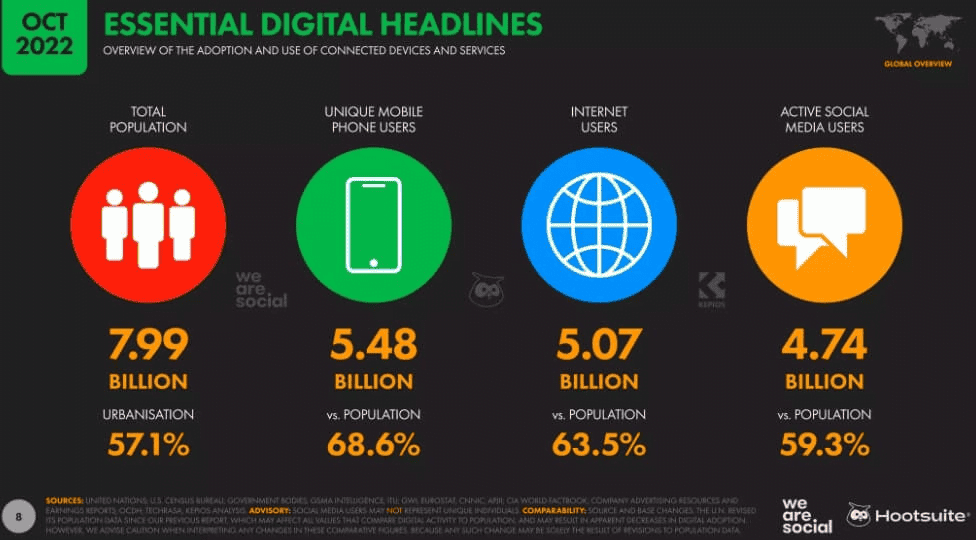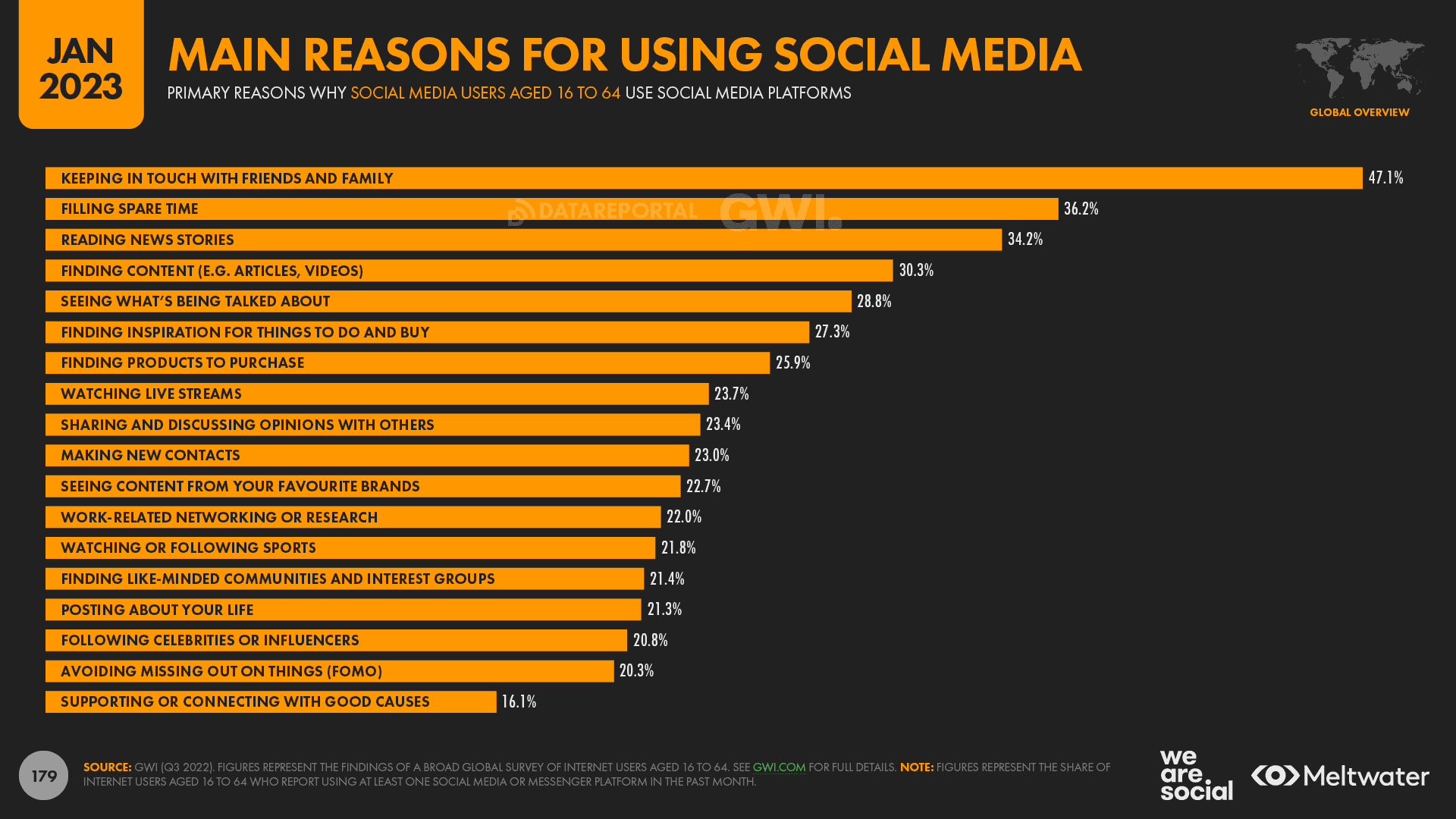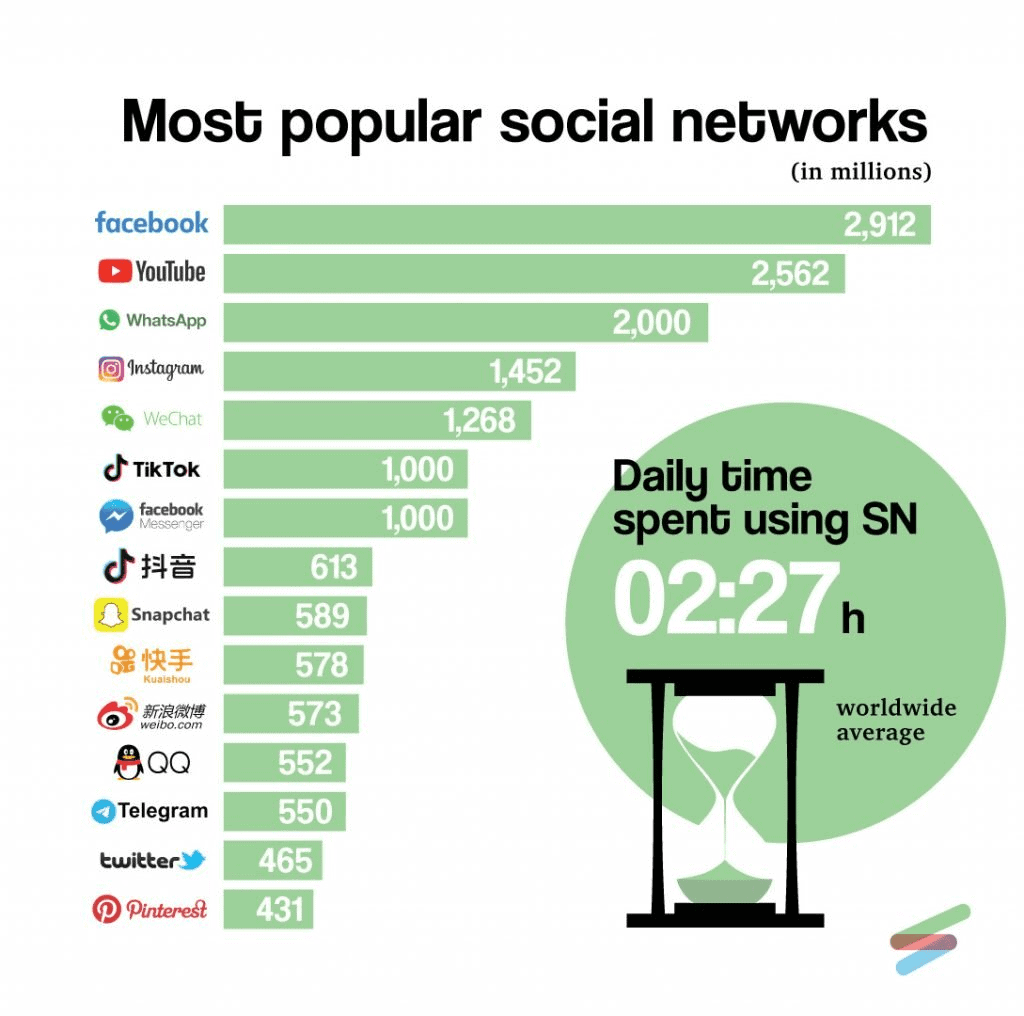Good marketing is essential for any business, and social media marketing can often be the most crucial part of your marketing strategy. More than 4.26 billion people were using social media in 2021, with that number estimated to rise to nearly 6 billion by 2027.
This means that marketing teams and agencies must pay attention to what is happening on social media; what the current social media trends are and what people are talking about. A large part of any marketing strategy is driven by data that you can collect from multiple sources including your website, your email marketing, and, of course, your social media platforms. So how can you collect social media data?
A truly efficient social media marketing strategy should be like a two-way street; you should collect data from social media users and then use that data to inform your marketing on social media. Just what is social media marketing and how should you collect data from the platforms you utilize?
What is social media marketing?

Image sourced from smashballoon.com
Social media marketing is a combination of having the ability to create relevant and engaging content, and using data to inform this content. This data comes from the posts you create, the posts created by others, and also from posts created by the social media users themselves.
Your posts may refer to particular products or services or they may just be designed to spread brand awareness. Whatever their purpose, they should be informed from the data that you collect as you move forward, data that will increase in volume every weekend every month.
What should you be looking for? You should be looking at what trends are hot new topics on social media platforms. You should be looking at what hashtags are currently trending so you can add them to future posts. And you should be looking for influencers in your sector with a significant following so that you can approach them about partnerships.
Where should you be looking for data on social media?
With so many platforms, pages, and groups, it can be hard to decide where to collect data from on social media. The starting point is, of course, your own page. How people react to and engage with your posts is the foundation of your data collection.
When people react negatively to your posts, you need to ask yourself why. Was it the subject, the content itself, or the brand as a whole they have an issue with? Likewise, you want to notice if there are any patterns to positive reactions. Do people respond well to a particular type of post, such as video content, or is it the actual written content they like?
Beyond your own page, there are certain areas you want to focus on. You will want to join and monitor pages and groups that are relevant to your business as these will be good – when allowed – to cross-post to. You also want to identify influencers who talk about similar products or services. You should also monitor platforms you don’t use as well as those you do.

Image sourced from datareportal.com
Groups
Groups that are relevant to your brand are essential when it comes to collecting data. The data from these groups can not only help you understand the type of content that like to people engage with, it can also identify current trends and individual factors such as hashtags.
Forums
Of course, social media is far more than Facebook. Reddit can be a good source of data as there are multiple discussions on relevant topics. Pay close attention to threads that deal with specific questions such as ‘what is a speaking engagement?’ These threads can provide data that can help your marketing and your SEO.
Competitor pages
Your competitors can be a great source of data. What type of content is working well for them? By monitoring, collecting, and analyzing data from competitor pages, you can improve your own content.
Influencer pages
You should never underestimate the power of influencers. Influencer marketing has a projected value of $21.1 billion in 2023. If an influencer has a good reputation and a large following, then a partnership with them could boost your marketing efforts.
General pages
As well as specialist pages or groups, you also want to monitor for any mention and discussion of your brand and products. You can use specialist ‘social listening’ tools to see what people are saying about you. If someone is consistently saying good things about you, consider making them a brand ambassador.
What types of data should you consider collecting?

Image sourced from statisticsanddata.org
Some of the data you collect may be very specific to your business.For example, you may want to know what sort of people are discussing PandaDoc memorandum of agreement templates to see if previous content promoting it has worked well.
There are many automated tools available that can harvest the global data you need and want. Combined with a good analytics solution, this means that what may have seemed like an impossible task becomes relatively easy.
As well as exact data, there is also a lot of generic data that will interest almost any organization. You should be looking at your own followers, those of competitors, and also those of relevant influencers.
Geographic data
You really want to know where customers and potential customers are located. There is little point in reaching out to people on the other side of the world if the shipping costs on any products would be prohibitive. As with other types of data, geographic location allows you to segment your customer base. You can then consider deals like same-day delivery for those close to your logistics centers or even free shipping on orders over a certain value for those further away. Additionally, optimizing shipping routes and negotiating bulk discounts can help reduce shipping costs and improve overall profitability.
Time
What times of day are your target groups using social media and how long are they spending on specific platforms? Having accurate data on these behaviors can help you plan scheduling of posts so you know they will reach a wider audience.
Content
You want a good overview of what type of content works well on each platform you use. What works well on one platform may not see the same levels of engagement on another, so you need to be aware that you may need to utilize different tactics for each. Some of the content that performs well can include UGC (user generated content). People like to see user videos or recommendations from their peers. You may also want to ensure you have a YouTube channel for ‘how to’ and other relevant videos.
Demographic data
Depending on your business type, particular demographics will play a big role in your marketing efforts. For example, the 19-25 age group are likely to have more interest in a post about fashion than one about a sample indemnity agreement. Where possible, collect data on ages, gender, interests/hobbies, and even profession. This data can be of immense help when it comes to segmenting your customers and in ensuring that any targeted content meets the needs of any segmented group.
Hashtags
Knowing which hashtags are attracting the most attention means you can add them to future posts so that more people notice you. Hashtags can be a two-way street too. Have hashtags that identify your brand or product and customers can then use them in their own posts.
Engagement levels
As well as looking at the type of content that works, you want actual quantitative data on any content you have posted. That can include how many people have liked or commented on a post, shared that post, or clicked any links.
Followers
Another piece of data you want to look at regularly is how many people have started following your page after seeing a post. This is best monitored on a weekly basis so that you can see what your growth rate is.
Reach
You could create the greatest piece of content ever, but it’s not much use if it only reaches 10 people. Look at how many people each post reaches.
How to use the data you have collected

Free to use image from Pixabay
It’s not just about collecting data from social media, it’s about analyzing and understanding it then using it to improve your marketing messages. You can even use the collection of data to carry out A/B testing on different elements of your content so that you can produce optimally performing content in the future.
Now, it may sound like an awful lot of work and an incredible amount of data to collect and analyze. And it is. However, there are multiple automated AI-powered tools that can do the work for you so that – after adding in your desired parameters – all you need to do is sit back and read the results.
You should also remember that this is not a one-off exercise. Your analysis and use of social media data to inform your marketing should be a regular and ongoing strategy. Trends change, people change, competitors’ prices (and tactics) change, so you should be using the data constantly, especially when it changes.
Problems
You want to see if you can identify specific issues customers may be having. This could be as simple as problems with shipping or as complex as technical issues they are having with a particular product or service.
By identifying these issues, you can tailor future content to how your brand can solve these problems for the customer. That could be a post that embeds a video from your YT channel on how to set up a technical product or simply a customer service guide and link.
Pay to play
Harvesting data from social media helps you identify your best-performing organic posts. If a post performs especially well, then it may be worth considering paying to boost that post and extend its reach.
Improve content quality
Of course, one of the primary reasons for collecting social media data is to understand your customers’ wants and needs better and to produce content that engages with them better. Good data can invigorate your own social media content.
Use new channels
You may not use every social media platform or channel. However, the data you collect may indicate that some of your target demographics are on those unused platforms in significant numbers. That data may nudge you into launching on that platform.
Change content type
You may only be publishing certain types of content. This could be down to something as simple as not having a videographer on your team. If the data shows your customer likes videos, it’s worth outsourcing making them or even using videos made by your customers.
Create a better customer journey
The ultimate goal of any marketing strategy is twofold; drive customers to make more purchases and improve their customer experience. As the data helps you understand them better, you can achieve both.
Final words on Collecting Social Media Data

Free to use image from Pixabay
You probably already know how important data can be and are tracking multiple sources such as your website. But with so many people using social media on a daily basis, how well are you collecting data from there? One goal you can have is to establish your brand as a leading authority in your sector.
For example, you may be monitoring a forum relevant to the products and services you provide and see a query about how to change JPG to PDF. By answering accurately and even including links, you can both help establish that authority and drive people to your website at the same time.
Social media has the real potential to provide you with insights that allow you to make informed decisions that can have a positive effect on your overall business. It can help you understand your current customers better as well as see what you have to do to attract new customers too.


